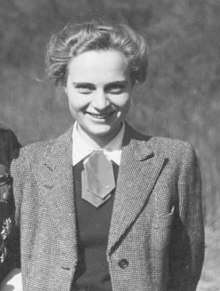Margarethe von Oven
Margarethe von Oven (11 March 1904, Berlin – 5 February 1991, Göttingen) was a secretary in the Bendlerblock and an accomplice in the 20 July plot to assassinate Adolf Hitler.

Early life
Margarethe's parents were Prussian nobility. Her father was Lieutenant Colonel Ludolf von Oven of the 115th Guards Infantry Regiment (1st Grand Duchy of Hesse. Her father was killed on 22 August 1914 in the opening weeks of the First World War. Margarethe was raised with three siblings by her mother.
Career
In 1920, Margarethe began work as a secretary in order to support her family financially. In 1925, she took a position as a secretary in the Defense Ministry and in 1928 she was sent to the military attache's office in Moscow for six months under an assumed name. She was on a secret mission at the time when the Reichswehr and Red Army were still collaborating. From 1930 to 1935 she worked in Berlin at the Reichswehr Ministry. In 1938 she moved to Budapest and later, in 1940, to Lisbon as a secretary in the German military attaché office.[1]
At the Bendlerblock
In her prewar Berlin days, she had worked as a secretary for Colonel General Kurt von Hammerstein-Equord and Colonel General Werner von Fritsch in the Bendlerblock headquarters of the Defense Ministry. In the summer of 1943, Major General Henning von Tresckow requested that she be transferred to his office, placing complete trust in her because she was his wife's best friend since childhood. Through her relationship with von Tresckow, Margarethe was drawn into the preparations for the 20 July 1944 coup attempt against Hitler known as the 20 July Plot or the Valkyrie Conspiracy. Because von Tresckow was assigned to the Eastern Front, Margarethe was reassigned as a secretary in the headquarters of Army Group Centre, serving as a news headline monitor for the Berlin coup plotters. She also typed the orders and decrees in preparation for the coup. She frequently met with Tresckow and Claus von Stauffenberg during the summer and fall of 1943 outside the Bendlerblock in order to discuss and modify orders and was fully aware of the plot. [2]
Arrest
After the failure of the assassination attempt on 20 July 1944, Margarethe was jailed for two weeks, but was then allowed to return to her job at the Bendlerblock.
Post-war
After the war, Margarethe von Oven worked for one year in Switzerland, then returned to Germany and worked as an assistant in a medical practice. In 1954, she was employed in the investment management office for the House of Brandenburg-Prussia. In 1955, she married Wilfred Graf von Hardenberg, brother of Karl Hans von Hardenberg, living in Göttingen until her death.[1]
Film portrayals
In the 2004 German production Stauffenberg, von Oven is portrayed by actress Stefania Rocca. In the 2008 film Valkyrie, starring Tom Cruise as Claus von Stauffenberg, she was portrayed by Dutch actress Halina Reijn.
References
- von Meding, Dorothee (June 1997). Courageous Hearts: Women and the Anti-Hitler Plot of 1944. Translation by Michael Balfour and Volker R. Berghahn. New York: Berghahn Books. pp. 51–53. ISBN 978-1571818539. Retrieved 18 January 2014.
- Ueberschär, Gerd R. (2004). Stauffenberg: der 20. Juli 1944. Frankfurt am Main: Fischer, ISBN 3-10-086003-9, p. 107.
Further reading
- Hardenberg, Reinhild Gräfin von (2003). Auf immer neuen Wegen: Erinnerungen an Neuhardenberg und den Widerstand gegen den Nationalsozialismus, Berlin: Lukas Verlag, ISBN 978-3-93687-2-026, pp. 85–89.
- Vollmer, Antje; Keil, Lars-Broder, eds. (2013). Margarethe von Oven (1904–1991) in: Stauffenbergs Gefährten. Das Schicksal der unbekannten Verschwörer. Berlin: Hanser, ISBN 9783446241565